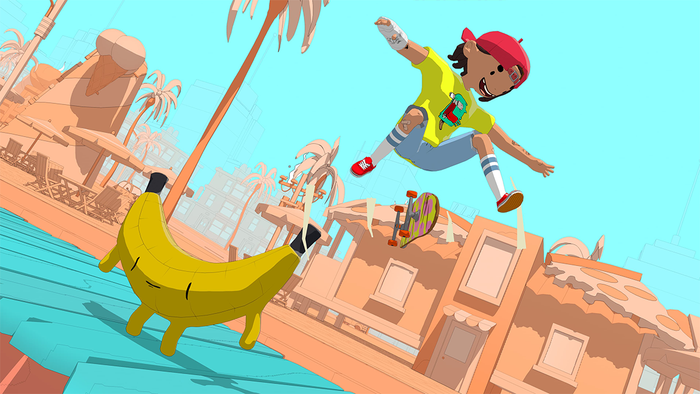
Featured Blog | This community-written post highlights the best of what the game industry has to offer. Read more like it on the Game Developer Blogs.
Distributed Narrative Collectables and Diegetic Choice Field Exploration
A short discussion on how story and choice in games can be made to align effectively with the power dynamic formed between a game and its players.

If there's one thing I know for certain from the two decades I've spent playing video games, it's that we like to collect things. I would speak for myself but I believe that it applies to most players, be it coins in Temple Run or armour sets in Diablo 2. There is a feeling of accomplishment to be had from collecting the piece of content which a game is actively trying to conceal from the player. All of the play involved in that process is eliminated when the same content is effortlessly delivered to players. The answer to why it works that way I'm sure is buried somewhere inside a thick book on behavioural psychology, but what I feel is more important and requires our attention is the intrinsic call to action they bring to players long before any sense of accomplishment is finally delivered. I feel these collectables make for an incentive so powerful that anything put on the other end can translate to a reward for the player.

Inviting players to play my game and immediately sitting them down to listen to my story before grabbing their attention feels like reciting Shakespeare to a class of kindergarten students during recess. Simply distancing the story from the player and expecting them to cover that distance through play appears to make all the difference in the Souls games. Reading the description attached to an item is more meaningful when I’ve put work into acquiring it. The game isn’t asking me to read it, I read it because I was respected with the freedom to choose if I wanted to read it. I feel this detachment is almost necessary so players don't feel the story is being pushed onto them. The NPCs and their quests further expand this technique by behaving like an intricate system with moving parts of its own. More of the story is revealed after players poke and prod at this system, play with it, to figure out how those moving parts fit together. We expect players to learn the controls before they’re comfortable playing a game, in a similar fashion, Dark Souls expects players to learn the rules of the narrative before they can make an attempt to assemble it. Moreover, with a spread of distinct events waiting (and sometimes not waiting) for me to come and investigate, turns every nugget of story into something the player has to pull from the game. The same feeling isn’t evoked when the game world conveniently waits for the player to consult a list of quests laid out in a journal or notebook. Most if not all mainstream games today feel the need to reify these goals with journals and quest logs instead of having the game’s fiction lift that burden. It’s an accessibility constraint of modern game design, we need to allow players to pick up from where they left off and not be completely lost - but for a niche audience, that laundry list is uninviting and feels like a lost opportunity. Collectables aren’t worth collecting if they can’t be missed.I like to think that every element in a game is always looking to find more and more reasons to exist. There’s a fight for legitimacy of sorts. We can put more stuff in our game but it has to make sense or fall into place by somehow affecting or relating with other elements already included. I personally like to follow the Rule of Thirds - if an element or mechanic doesn’t synergize meaningfully with at least three other elements or mechanics in your game then it’s probably not worth including in the game. In the Legend of Zelda: A Link Between Worlds, rock formations initially dismissed as decoration later help to guide players when they’re running off into the distance with the Merge ability. We discover these synergies each time we recognize how a certain element belongs in the situation or problem we’re trying to solve during play. What’s most important is that it’s a realization, a revelatory moment for players since they’re the ones who put the pieces together to arrive at that moment where they learnt the one thing which they failed to recognize, despite it being presented before. Developers harness/exploit every asset they introduce by creatively pairing them against each other as much as possible. Saws in Super Meat Boy remain static in the first few levels, later they’re attached to rotating arms and finally turned into projectiles fired at timed intervals. Rather than manually fabricating these creative combinations and revealing them at a controlled pace, other games allow players to explore a contained space where they can discover these synergies for themselves.
Depending on what’s available and what surrounds the player at any particular moment in a game, they always have a wealth of actions to choose from moment to moment, a ‘choice field’ of sorts. Players don’t take action after the game explicitly offers this choice, things work the way players expect because they’re part of the ruleset, the mechanics, which they’ve learnt over the time they’ve spent playing the game. The Hook Shot in The Legend of Zelda: A Link Between Worlds is used to hit enemies, pull lighter targets nearer to Link, break wooden shields, stun enemies, grab faraway pickups and sometimes even pull Link closer to heavier targets. Players are allowed to experiment with their tools by engaging in a satisfactory disambiguation process where they might ask themselves “what would happen if …”, which slowly reveals to them the many applications of the tools at their disposal. Now there’s play involved in the learning process. The level designer might carefully assemble multiple scenarios where players would be left with no choice but to apply these synergies, but the game itself doesn’t alter its ruleset to accommodate the progression and instruct the player of a change in verbs at any moment. The game also masterfully refrains from from acknowledging which particular application of the verb becomes relevant in any situation which works to facilitate meaningful decision making. Take Humanity in Dark Souls, an item that gives you one Humanity (enables multiplayer among other things) and a large chunk of HP on consumption which it explicitly details in the item description. You are free to choose how to use this item whenever and however it proves useful to you, the game doesn’t acknowledge the fact that you consciously made one of those two choices, it merely follows the rules as it is instructed to. In this situation the player has power over the game, the game makes no attempt at dismissing the fact that the player knows better.
Games focused on narrative that boast choice and consequence gameplay when studied through the same lens make for a more interesting discussion. A story fails to gain importance in a game when it doesn’t synergize with any of the player’s doing. It seems to me that games today feel the need to celebrate the availability of choice; more importance is given to the choice being served to players than how players react to them and how effectively they’re being made to struggle juggling between possible consequences. Telltale “hits their players over their heads every time they make a choice” (1) with the infamous “Clementine will remember that” notification because it’s impossible to deliver immediate feedback through the story at that very moment. When we break the fourth wall to inform players explicitly that the game is taking note of their actions, it feels almost as though the act of delivering the choice has become an end in itself. It can be argued that narrative choice is still a relatively new concept for the wider audience that was introduced to games in the last decade which might warrant this kind of design, but many games some older and some newer have moved beyond the point where they would feel the need to pride in being able to vend choice to players; games that I think have carefully observed the subtle difference between presenting choice and listening to player action.
I appreciate games that execute choice in a more diegetic manner by allowing players to leverage the verbs they’ve familiarized over the time they’ve spent playing the game. Some games go even further and leave choice as content that’s waiting to be explored which players might overlook; choice that behaves like a collectable and later a commodity they can exchange over the internet. I would refrain from reminding players that we’re listening before or immediately after the moment I take note. Listening to player action that falls inside of the verbs they’ve almost internalized (swing, hit, jump) I feel is a reliable way to make sure we don’t mistakenly hint at the fact that we just hit the ‘record’ button. The Walking Dead sits on one end of this spectrum when compared with other games like Chrono Trigger, Bloodborne and Deus Ex. In the process of halting gameplay to produce context aware dialogue options, a game immediately declares that it is now listening to hopefully respond accordingly later in the story. It’s made completely clear that a choice is available in the first place - games that patiently waited before delivering their response in a timely manner to later surprise me, have made for some of my favourite and most memorable moments in videogames. It’s not possible to elicit that same response from players if they’re not being caught off guard. With dialogue options I feel we ruin the surprise before we could even set it up.
I look to games that maintain players in a position where they are made to believe that every action they perform is a choice with an associated consequence. Playing the game then becomes an exploration of how the world responds to your actions in different ways. “Don’t Be a Fool… Run…” shouts Paul Denton after instructing JC to flee from the back window before the conversation is closed and control is delivered back to the player. With Men in Black threatening to storm through the front door of the apartment, the moment is amped with enough tension to put players on the spot. In the most recognizable form of offering this binary choice, another game would rise to the moment with UI elements and on-screen instructions wrapped up neatly with a countdown timer slowly moving to zero. Deus Ex isn’t quick to jump in and show off because it’s burdened itself with the responsibility of playing out a simulation. The time constraint is made implicit with game objects waiting to enter the arena on their queue, a progress bar is not required to reify this urgency. By bringing it down from a dangling UI element floating in front of the camera to reflecting it accurately through the situation being played out inside the fiction of the game, the delivery is made more diegetic - you can’t take forever to make this decision because agents are ready to break into the apartment, not because an imaginary number is counting down. The game also doesn’t instruct players to make a decision by picking between two context sensitive buttons on the screen but offers them the freedom to exercise the choice through the application of the first mechanic they learnt hours before this moment finally presented itself. Deus Ex confidently resumes play without a single hint towards the availability of this binary choice outside of what the character had to say, even the in-built quest log (Goals/Notes) describes a distant objective that is completely unrelated to the matter at hand. Multiple elements fall into place after a meticulous process of carefully introducing different mechanics over a long period of time to slowly have them converge and arrange a moment like this one. Even Deus Ex doesn’t always make the effort to arrange these set ups in every situation where a choice is made available.
The dialogue choice also defaults to misrepresenting the possibility space. In that moment the game has made it clear that I can only choose one of three options and nothing more. Some games might selectively introduce dialogue options but that doesn’t remedy the obvious reinforcement of a limited possibility space. We can encourage exploration only after we create expectation by inviting players to investigate the boundaries themselves. Bringing players to a place where they’re actively looking to make a difference inside the game world is an intricate process which involves balancing carefully between creating and delivering on said expectations. When you’re made to realize that the tools which enable your decision making powers rest within the ruleset you learnt moments after you first started the game, brings a sense of empowerment that no amount of game design trickery could ever come close to delivering.
Players who doubt the story behind the aptly titled “Suspicious Beggar” in Bloodborne can test their confidence by slashing at him. The trial sequence in Chrono Trigger didn’t require collecting years of dialogue tree decisions over a trilogy of games to prepare, it delivered more punch with only about an hour of simple RPG interactions which the game chose to listen in on. These diegetic choices are only just another manifestation of the verbs in the game, put simply, they are made more meaningful now that players are free to explore how they might prove useful outside of their primary and default function. Rather than picking a favourite from a few dialogue options, players are now searching to find more ways to affect the world. Slip on the Darkmoon Seance Ring at the Darkmoon Tomb in Dark Souls and a giant statue disappears to unlock a new area. Overalls in Bloodborne grant stat boosts like poison resistance or fire defence but when players encounter Adella the Nun reluctantly praying to the Healing Church, they know exactly what to do from one look at their inventory.
These obscure choices are mostly discovered and documented through a collaborative effort by players on the internet. This is also sometimes lodged as a complaint by those who believe these secrets are somehow rendered meaningless when most players discover everything that’s hidden, in effect the game is ‘solved’ and requires no more attention. This brings me to the ultimate key to what I’m trying to say with everything we’ve discussed up to this point. I like to think that games and players form a power dynamic, players exert power over the game to achieve dominance over the system. This struggle is made more meaningful when the game understands this and responds accordingly with resistance, something I’ve come to expect from games. An element in a game doesn't require further validation once it finds itself meaningfully contributing to this power dynamic.
Hiding the story behind collectables carefully placed off the beaten path aligns our imaginary narrative with this power struggle that we maintain so responsibly when dealing with other tried and tested mechanics like enemies, boss fights and rare items. These collectables further reinforce this alignment when they carry relevant information about the game world which players can verify through play. If NPC's in Dark Souls aren't telling you about some area on the map which you might eventually visit, they won't forget to share their biased opinions about each other. On the surface it might seem that following an objective marker on-screen and trusting a visual walkthrough on the internet are one in the same thing, but when a game goes out of its way to coach me on how to manipulate itself, I am no longer inclined to exert power over it. I could ask a friend to help me out by joining my game, or I could refer to wikis where players have solved the problem as a community - in either of those cases the solution isn’t coming from inside the same system that I’m trying to overcome. There’s nothing wrong with stories told in linear cutscenes but they don’t always serve the purpose of providing a resistance in any way. The disconnect between play and story is a phenomenon that is unique to games. We employ many techniques to close this gap without realizing how this dissociation could be leveraged creatively to our advantage. There’s only a subtle difference between granting players with a few seconds of agency between story chunks versus trusting them with the tools which they can later use to have their voice be heard in the game. I look forward to making games where I can trust players with that power.
-Vidhvat Madan
1 'T.M.I.': Preserving the suspension of disbelief through ambiguity
Read more about:
Featured BlogsAbout the Author(s)
You May Also Like







